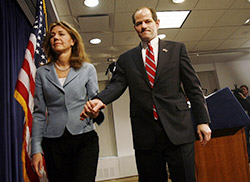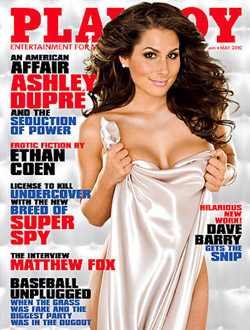Of Testosterone and Pheromones
This post is a review of Client 9: The Rise and Fall of Eliot Spitzer, Directed and Produced by Alex Gibney.
CLIENT 9 IS AN ARTFULLY PRODUCED, smartly edited, and dramatic reconstruction (and revisionism) of the rise and fall of “The Sheriff of Wall Street,” the man who dared to challenge the “Masters of the Universe,” Eliot Spitzer. Most of us are well aware of what happened to Spitzer in his fall from grace in a now all-too-familiar story of sexual shenanigans gone awry, but there is a redemption story here as well. Whether that works for viewers or not probably depends on one’s political persuasions and personal predilections on matters political and prostitutional.
Alex Gibney, whose previous film was another rise-and-fall epic tale entitled Enron: The Smartest Guys In the Room, is unabashedly sympathetic to Eliot Spitzer in Client 9 (his designation by the madam who orchestrated his hook ups). In an on-camera narrative that runs throughout the film, Spitzer makes no excuses for either his overweening ambition as the left’s lawman against Corporate Corruption, or for his biblical-like fall from grace as the right’s punishment for those who fly (and pry) too high and deep. The central thesis of Client 9 is that Spitzer was the victim of Wall Street heavy-hitters who would brook no probes into their sleazy back-room deals that Spitzer was on the verge of uncovering just before he was busted for his personal patronage of a high-paid prostitution ring. A cast of characters is then paraded throughout the film as those who would bring Spitzer down: the former Republican Majority leader of the New York State Senate Joe Bruno, the former chairman of A.I.G. Maurice R. Greenberg, the former director of the New York Stock Exchange Kenneth G. Langone, and a flamboyant Republican political consultant named Roger Stone. Hinted at but never directly stated, the film implies that had Spitzer not been sabotaged in his investigations of Wall Street corruption the economic collapse might have been averted. The evidence for the central thesis is circumstantial; the evidence for the covert thesis is nonexistent.
In point of fact, in the final on-camera interview statement by Spitzer, when asked if he thought he was the victim of his Wall Street enemies he unhesitatingly denies the thesis and takes full responsibility for his collapse and apologizes to his family for his own misdeeds, pointing no fingers at anyone but himself. In this sense, if the point of the film was to resurrect respect for Eliot Spitzer, it does have that effect through his own words. However, as in all nonfiction works, from books to documentaries, there is here an element of what is said versus what is not said.
What is said is that Spitzer was a crusader for the little guy who stands no chance against the mighty Wall Street bankers and financiers—the regular Joes and Janes whose tiny IRAs and 401Ks are in the hands of high-stakes gamblers who do not give a damn about long-term retirement investments that are the backbone of a stable economy. (Recall in the run-up to the meltdown that far too many people quit saving and started gambling with adjustable rate mortgages but could not “flip this house” before the higher monthly payments came due—more on that in my review of the documentary film Inside Job next week, which also leaves out the greed of American consumers while focusing on the greed of Wall Street bankers and housing lenders.)
What is not said is that Spitzer’s tough-guy, law-and-order crime-busting activities included breaking up and prosecuting prostitution rings in New York, which is how he came to know (intimately) the inner-workings of the system that he then exploited for his personal pleasure, arranging sexual liaisons with women whom he couldn’t even be bothered to engage in conversation with before getting down to the dirty deed of wham, bam, thank you ma’am. (Upon realizing who her client was, one of the women—whose working name was “Angelina” and who was portrayed by an actress in the film—recounted how she really wanted to talk to Spitzer because of his reputation of being so smart and worldly, but apparently Spitzer’s tongue was tied that night.) The liberal man of the people—the voice of the voiceless, the power of the powerless—treated women as little more than fresh flesh. Oddly (or perhaps not) the infamous Ashley Dupré, whose quarter-hour of fame has now come and gone, refused to be interviewed for the film having, I suppose, shed her crocodile tears before a scolding Diane Sawyer in an exclusive ABC television interview (orchestrated with the launch of her singing career).
Here the film offers some insights into a world few can afford: The $1000 to $3000 an hour call girl. As the head of the Emperor’s Club explained, these are not alcoholic drug-addicted women who were abused as children and kept as virtual slaves to their pimps; these are ambitious beauties who, as one of them explained, likes to have her bank account filled and is now so spoiled with riches, jewels, trips, and the accoutrements of the lifestyles of the rich and famous that she can no longer date regular guys. These women are so hot that one of Ashley Dupré’s co-workers described her as possessing “great pheromones” and “an amazing coochie” (one of the service’s websites even includes a checklist of requests, from blond, brunette, or redhead to shaved, unshaved, or partial) that men could not resist, especially high testosterone men like Eliot Spitzer who can afford rates commensurate with such assets. (During the scandal I recall an interview with an evolutionary psychologist, who explained that you can tell Spitzer has high testosterone because of his boney features and high cheek bones.) One memorably funny line is when the head of The Emperor’s Club explains how she computed a full-day rate: just add a zero to the hourly rate (said with a sophomoric giggle but with a twinkle in her eyes as if to say “I can’t believe this rich bastard fell for this scheme)! A woman who goes for $2000 an hour will give you a full day (and night) of her time (and body) for $20,000. What is not said is what the agency’s commission was, but the women were apparently not complaining, and you can’t exactly go to the labor board to complain.
The salacious material, however, is secondary to the deeper Greek tragedy (think Icarus) theme of hubris and arrogance punished by the gods. Seen in conjunction with the documentary about the collapse of Wall Street and the subsequent recession—Inside Job (in which Spitzer also makes an appearance)—Client 9 is well worth seeing as long as you keep in mind that this film, as all films, has an affective agenda. But do bear in mind that Spitzer landed his own television series on CNN before this film was released. So the resurrection process had already begun.




